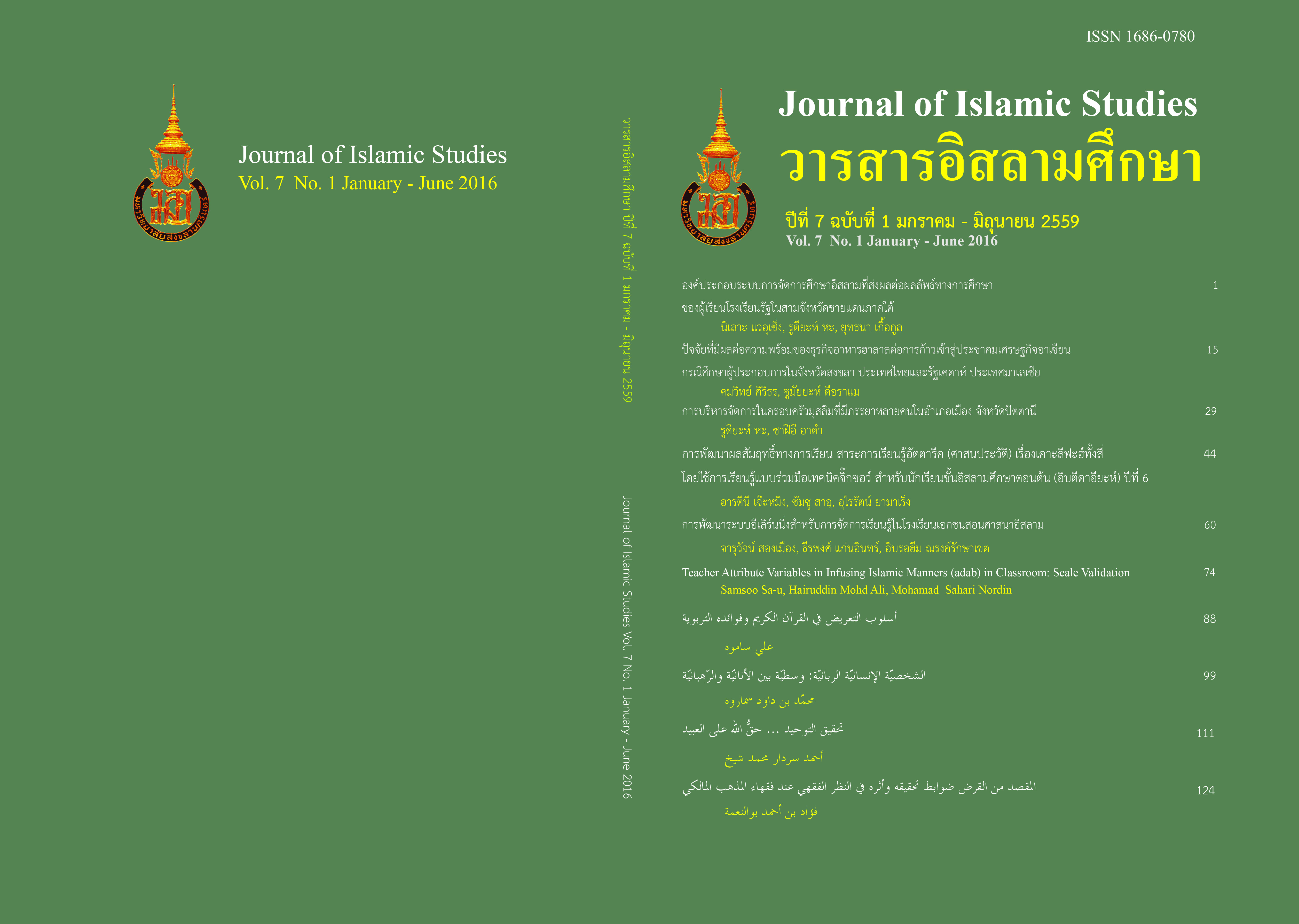Rabbanic Human Personality: Wasatiyyah between Selfishness and Monasticism
Keywords:
Rabbanic, Wasatiyyah, Selfishness, MonasticismAbstract
This article shows that selfishness is a human characteristic that cares about one’s own desires and pleasures and ignores others’ and their interests. While monasticism is a description for the person who devoted his life for God’s worshipping, and overrides the human desires and primitive needs, as well as Isolated from the others and their concerns without trying to improve their conditions. Selfish’ attention is purely worldly, whereas the monastic’s attention is about religious aspects only. Selfishness and monasticism share the lack of interest to others, and not guide them for better life.
The article concludes that The personal Muslim demand (humanity trait and Rabbanic direction) is mediation and moderation in the interest of both sides: the religious and secular attention to the interests of others and their good. What makes the Muslim distinction is being Rabbanic and Commitment to the ethics in his activities and community services with ambition to gain material superiority, and spiritual highness through connecting life with hereafter. Therefore, a Muslim who is brought up by the Book of Allah the Almighty and the Sunnah of His Messenger, peace be upon him, through Islamic education curriculum and requirements of the social bringing up, has a personality that combines the divine and human, who is righteous by itself and good to others, useful in this life, aims to win in the hereafter, median in his perspectives and its attitudes, and being witness on others.
References
ابن هشام، السيرة النبوية، مع شرح أبي ذر الخشني.
ابن سعدي، عبد الرحمن السعدي.1421ه. تيسر الكريم الرحمن في تفسير كلام المنان، تحقيق: عبد الرحمن معلاّ اللويحق، مؤسسة الرسالة، ط1.
ابن عبد البر، يوسف بن عبد الله. 1387- 1421هـ. التمهيد لما في الموطأ من الأسانيد، تحقيق: مجموعة من المحققين، وزارة الأوقاف والشؤون الإسلامية – المغرب، ط2.
ابن ماجة، محمد بن يزيد. د.ت. سنن ابن ماجة، تحقيق: محمد فؤاد عبد الباقي، دار إحياء الكتب العربية (فيصل عيسى البابي الحلبي).
الألباني، محمد ناصر الدين.1415هـ، سلسلة الأحاديث الصحيحة وشيء من فقهها وفوائدها (السلسلة الصحيحة)، مكتبة المعارف، ط1.
الألباني، محمد ناصر الدين.1417هـ، صحيح سنن ابن ماجة – ضعيف سنن ابن ماجة، مكتبة المعارف، ط1.
الألباني، محمد ناصر الدين.1419هـ، صحيح سنن النسائي– ضعيف سنن النسائي، مكتبة المعارف، ط1.
البخاري، محمد بن اسماعيل. 1423هـ. صحيح البخاري، دار ابن كثير: دمشق – بيروت، ط1.
بوعود، أحمد . 1421هـ. فقه الواقع:أصول وضوابط (تقديم الأستاذ عمر عبيد حسنه)، إصدار وزارة الأوقاف والشؤون الإسلاميّة بدولة قطر، ط1.
الحاكم، محمد بن عبد الله. 1422هـ. المستدرك على الصحيحين، تحقيق: مصطفى عبد القادر عطا، دار الكتب العلمية، ط 2.
سعد، محمود توفيق محمد . 1415هـ. فقه تغيير المنكر (تقديم الأستاذ عمر عبيد حسنه)، إصدار وزارة الأوقاف والشؤون الإسلاميّة بدولة قطر، ط1.
الطبري، أبو جعفر محمد بن جرير .1420هـ. جامع البيان في تأويل القرآن، تحقيق: أحمد محمد شاكر، مؤسسة الرسالة، ط1.
عبادي، أحمد عبادي . 1416هـ. الإسلام .. وهموم الناس (تقديم الأستاذ عمر عبيد حسنه)، إصدار وزارة الأوقاف والشؤون الإسلاميّة بدولة قطر، ط1.
الكيلاني، ماجد عرسان .1411هـ. مقوّمات الشخصيّة المسلمة أو الإنسان الصّالح، (تقديم الأستاذ عمر عبيد حسنه)، إصدار وزارة الأوقاف والشؤون الإسلاميّة بدولة قطر، ط1.
مسلم، مسلم بن الحجاج.1427هـ. صحيح مسلم،تحقيق: نظر بن محمد الفاريابي أبو قتيبة، دار طيبة، ط1.
كحيل، عبد العزيز. 6 جماد الثاني 1432هـ. المسلم بين الربانيّة والإنسانيّة، موقع المسك، http://almisk.net/ar/article.php?id=4893
Downloads
Published
How to Cite
Issue
Section
License
Copyright (c) 2016 Journal of Islamic Studies, Prince of Songkla University, Pattani Campus, Thailand

This work is licensed under a Creative Commons Attribution 4.0 International License.
All articles Published in The Journal of Islamic Studies are author’s opinions, and not the responsibility of the Faculty of Islamic Sciences nor the editorial board. However any citation should be referred to the journal.
















